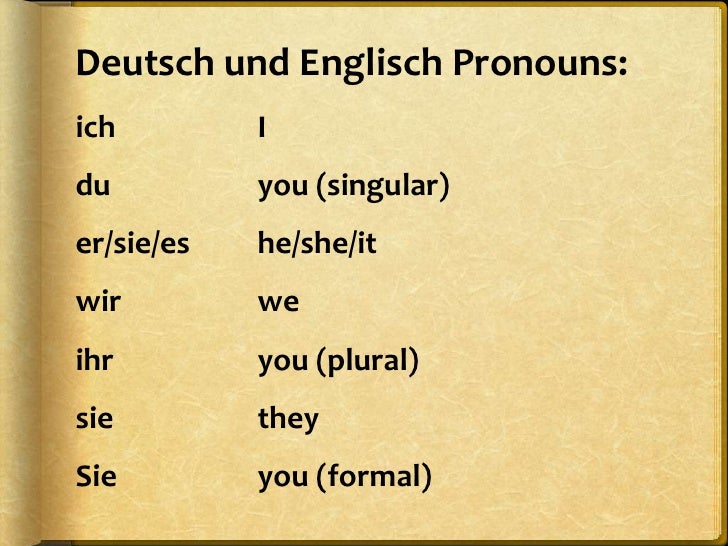Er Sie Ich · Film 2018 · Trailer · Kritik

FilmuniFilm Er Sie Ich
In the following chart you will find the conjugation of the irregular German verb wissen (to know). Although it is not a modal verb, the conjugation of wissen follows the same pattern as the modal verbs. Like the modals, and unlike normal German verbs, wissen has the same form for ich (1st person sing.) and er, sie, es (3rd person sing.).

Die Personalpronomen im Nominativ Learn german, German language, German language learning
Today I want to cover some German personal pronouns (ich, du, er, sie, es) and the corresponding endings of the verbs.You'll also learn how to ask a question in German. Did you know that German verbs (in the basic form) have mostly an " en " at the end?. For example: to eat, to drink, to come, to read… => in German: ess en, trink en, komm en, les en.

The present tense of German verbs The German Professor
German has four cases for both nouns and pronouns : Each case reflects the function of a noun in a sentence, and a noun changes form based on its case. The dative case is used for the indirect object in a sentence. For example: Ich habe meiner Mutter den Computer gegeben. I gave the computer to my mom.

Foto zum Film Er Sie Ich Bild 2 auf 7 FILMSTARTS.de
German personal pronouns ( ich, sie, er, es, du, wir, and more) work in much the same way as their English equivalents (I, she, he, it, you, we, etc.). When you study verbs, you should already understand pronouns well. They are a key element of most sentences that you should memorize and know by heart.

Pin auf Gramatica alemana
With essen, the stem changes (from ess-to i ss-) in the du and er/sie/es forms. In the case of wollen, the stem is will-for the ich, du, and er/sie/es forms, and w o ll-for the wir, ihr, and sie/Sie forms. Können (to be able) changes its stem three times in the present tense, going from kann-to konn-to könn-.

Irregular verbs презентация онлайн
Possessive pronouns in the nominative. In the nominative case, masculine possessive pronouns end in -er, neuter possessive pronouns in -s and feminine and plural possessive pronouns in -e.. Examples: Sie feiert gern Geburtstag, ihrer ist aber erst in einigen Monaten. She enjoys celebrating her birthday, but hers is in a few months.

Er Sie Ich · Film 2018 · Trailer · Kritik
http://youtube.com/vipmagazin | "Er Sie Ich" (Trailer deutsch german) | Kinostart: 08.03.2018---Bitte ABONNIEREN/LIKEN nicht vergessen:• http://www.youtube.c.

Er Sie ich (2017) Film, Trailer, Kritik
Past Tense (Vergangenheit) of 'Sein' in German and English Simple past tense - Imperfekt Compound past tense (present perfect) - Perfekt Past perfect tense - Plusquamperfekt Future Tense (Futur) Note: The future tense, especially with "sein," is used much less in German than in English. Very often the present tense is used with an adverb instead.

Uso de "es" en alemán Alemán sin Tapujos
What are personal pronouns? The basic German personal pronouns (Personalpronomen) are: ich, du, er/sie/es, wir, ihr, sie. These small words refer to people, things and concepts and can be used in place of a noun to avoid repetition. Example: Ich habe einen Sohn. Er hat heute Geburtstag.

Pronouns & verbs
Lesson 1: People - Personen. Ich, du, er, sie, es - these are the German personal pronouns. Expand your vocabulary with the Audio Tutor. Here you can learn new words and improve your pronunciation. I - ich. I and you - ich und du. both of us - wir beide. he - er. he and she - er und sie.

Deutsch lernen Personalpronomen, Deutsch lernen, Grammatik
In the previous lessons, you've probably noticed these pronouns: ich (I), du (you), er (he), sie (she), Sie (you), wir (us), ihr (you) and sie (they).

Er Sie Ich FilmRezensionen.de
OLD: Ich erinnere mich ihrer (MODERN: Ich erinnere mich an sie.) (I remember her.) OLD: Ich erinnere mich seiner (MODERN: Ich erinnere mich an ihn.) OLD: Ich entsinne mich ihrer (MODERN: Ich erinnere mich an sie.) In Modern German, erinnern rather takes the prepositional phrase with the preposition an. However, some verbs cannot be constructed.

Er Sie & Ich / Episode 18.7 Willst du eine Buchempfehlung
Was man über Personalpronomen wissen sollte. Die Personalpronomen, auch persönliche Fürwörter genannt, werden unterschieden nach: Personen: ich, du, er, sie, es, wir, ihr, Sie, sie Numerus: Singular und Plural Kasus: Nominativ, Akkusativ, Dativ, Genitiv In der 3.

Er Sie ich (2017) Film, Trailer, Kritik
German has subject pronouns, too: ich, du, er, sie, es, wir, ihr, sie, Sie. But there are TWO varieties of non-subject pronouns (<- called accusative and dative personal pronouns). And these are used at very distinct times. German has 4 different types of 'you'.

personel pronouns, pronom personnel, Personalpronomen mit Bildern, DAZ Salvabrani
Personal Pronouns. Personal pronouns are ich, du, er, sie, es, wir, ihr, sie and their declined forms. We can use personal pronouns to replace a noun that's already been mentioned, to speak about ourselves, or to address other people. Example: Ich habe eine Katze.
Conjugate regular verbs with ich, du, er, sie, es.. Great German
German conjugation. German verbs are conjugated depending on their use: as in English, they are modified depending on the persons (identity) and number of the subject of a sentence, as well as depending on the tense and mood. The citation form of German verbs is the infinitive form, which generally consists of the bare form of the verb with.